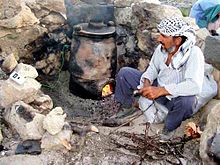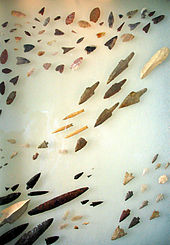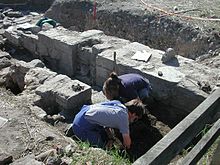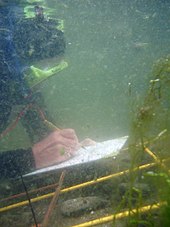Archaeology
Archaeology (ancient Greek ἀρχαῖος archaios, German 'alt' and λόγος lógos 'doctrine'; literally "doctrine of antiquities") is a science that investigates the cultural development of humankind using scientific and humanistic methods. It has developed worldwide into a network of the most diverse theoretical and practical disciplines.
Archaeology deals with material legacies of man, such as buildings, tools and works of art. It covers a period from the first stone tools about 2.5 million years ago to the near present. Based on new finds in Africa, which are about 3.3 million years old, a much earlier start of tool making is also considered. Material legacies of recent history (for example, concentration camps and bunker lines from the Second World War) are now also evaluated using archaeological methods, even if this approach of a "contemporary history" archaeology is controversial within the field.
Although archaeology is a relatively young science, it is hardly possible to survey all periods, so that different disciplines have developed. At the same time, the epochs can be dated differently from region to region, and in some cases they cannot be documented everywhere. In addition to the orientation towards epochs (e.g. medieval archaeology) or regions (e.g. Near Eastern archaeology), there is also specialisation in certain subject areas (e.g. Christian archaeology, legal archaeology, industrial archaeology).
Archaeology examines sources of different kinds. In prehistory and early history, one deals mainly with material culture; in early history, one also resorts to written sources. However, unlike scientists of other sub-disciplines of historical science, these are not the focus of archaeologists.
Findings on climate and environmental history, on nutrition or on the dating of finds also contribute to the reconstruction of past cultures.

Experimental archaeology: archaeological interpretations are tested in a reconstructed situation

Found objects must be evaluated and classified

Excavation of a ground monument (in-situ archaeology)

Documentation of finds in underwater archaeology
Findings
See also: Category:Archaeological site
See also: Category:Archaeological find
Archaeology in Germany
In Germany, archaeological monument preservation (Bodendenkmalpflege) is one of the tasks of the federal states (Landesarchäologe), usually organised as a separate department within the monument office. Larger cities often have their own city archaeology. The majority of excavations today are carried out within the framework of emergency excavations for the preservation of monuments, either by the offices concerned themselves or within the framework of company archaeology by commissioned specialist firms. Targeted research excavations are the exception, as unnecessary ground interventions are also avoided here and financing is only possible through third-party funding. Several institutions support researchers and projects through archaeology awards. An important funder of research excavations is the German Research Foundation.
German excavations abroad, on the other hand, are carried out within the framework of research projects of universities, the German Archaeological Institute or the Roman-Germanic Central Museum.
Questions and Answers
Q: What is archaeology?
A: Archaeology is the study of the human past through remains and objects left by people who lived long ago.
Q: What kind of remains do archaeologists look at?
A: Archaeologists look at old coins, tools, buildings, and inscriptions.
Q: What is the purpose of studying archaeology?
A: The purpose of studying archaeology is to understand how people lived in the past.
Q: Who are the people who study archaeology?
A: The people who study archaeology are called archaeologists.
Q: What can archaeologists learn from old coins?
A: Archaeologists can learn about the economy and social structure of the people who used those coins.
Q: What kinds of information can archaeologists get from tools?
A: Archaeologists can learn about the technology and production methods of the people who made and used the tools.
Q: How do archaeologists use inscriptions in their study?
A: Archaeologists use inscriptions to learn about the language, religion, and culture of the people who made them.
Search within the encyclopedia